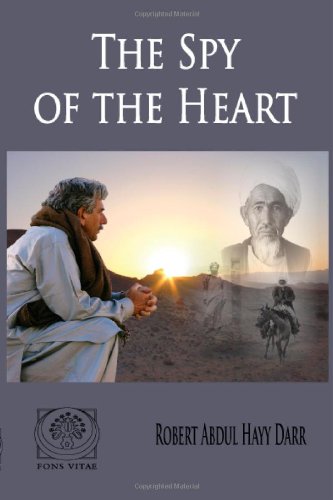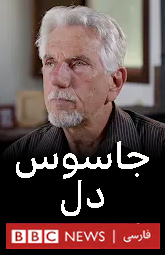| Ustad Abdul Hayy's Recommended Video: | |||
| The Tree Growing from a Stone | |||
| Lessons | VIEW ALL | ||
| 5/29/25 | Following the Path of Rumi | ||
| 11/29/24 | Lessons from a Sufi Teacher in Northern Afghanistan | ||
| Media | VIEW ALL | ||
| 3/8/24 | 2024 Interview of Ustad Robert Abdul Hayy Darr by Hira |
||
| 8/6/22 | Voices of Intimacy Appreciating the Variant Collections of Abdullah Ansari's Intimate Sayings, The Munajat by Robert Abdul Hayy Darr |
||
| 1/1/22 | My Oh My! How Very Lovely You Are! Ghazal by Masood Khalili, Performed by Robert Abdul Hayy Darr |
||
 |
|||
By Robert Abdul Hayy Darr |
|||
 |
|||
The Spy of the Heart (BBC News Documentary - Persian) By BBC Persian |
|||
 |
|||
Sailor, Sufi, Spy is a documentary portrait of Robert Darr–a teacher of traditional wooden boat building and of traditional Sufi spirituality in Northern California. As he restores the Freda, the oldest wooden sailboat on the West coast, he reflects on the intersections between art, beauty, adventure and spirituality. (56 min. RT). Film by Raeshma Razvi |
|||
|
Sufism has always sought to be pluralistic, inclusive and ecumenical in relation to all faiths. In the last few years, a type of strict literalism has taken over many Islamic communities and many people have been kept from the inner meaning of the Qur'an and the real spiritual satisfaction of religion. Supporters of this kind of literalist interpretation have gone against the facts of history. Actually, the purpose of outward devotion has been to attain to God-awareness and inner meaning. Aisha, the Prophet's wife, was asked about the state of the Prophet. She replied that in every state he invoked God. The People of the Way have always claimed that the Qur'an is the fundamental document that reveals the way of spiritual inspiration, the miraculous portal into the spiritual life through which one can know God through His Love, Existence, and Mercy for all creatures. For God has stated: "My Mercy encompasses everything." The religion of the People of the Way is the religion of Love, the religion of gnosis, the religion of spiritual mysteries and the love for God and his Prophet. The Sufi way is a path of turning away from passing phenomena and bringing one's full attention to the Source of phenomena. It is because of this perspective that the Sufi is addressing the heedless materialist. The latter may be just, constructive in the community, and outwardly creating a better world, but if unaware of the purpose of his own existence, he is lost. This purpose is summed up in an often quoted divine statement, "I was a Hidden Treasure and I loved to be known. I brought forth creation that I would be known." Abdullah Ibn 'Abbas has in his commentary on the Qur'anic verse, "And I have not created the jinn and humankind except to worship Me," to mean "except to know Me." God has said in the Qur'an: "There is rust upon their hearts from what they are acquiring." When individuals become lovers of God, their hearts are polished and cleared of stains and turbidities. The heart of the human can then be a mirror in which God is seen. A person can, in this way, witness God in his or her own heart. This is confirmed in the hadith qudsi (extra-Qur'anic revelation) that "My earth and my heaven do not contain Me but the heart of my faithful servant contains Me." God wants to make Himself known in the existences of His purified servants which are also His theophanic mirrors. The brilliant theophanies of the Mercy of God cause His lovers to become selflessly lost in Him just as they make themselves completely selfless to receive Him." Progress on the path of spirituality occurs through worship, clarifiying the self, and certain ascetic practices. These means are traditionally explored through the metaphorical language of spiritual poetry like the poetry presented in this book. Frequent references to wine and love attempt to convey a sense of mystical experience. Some of the references are metaphysical and rooted in Islamic theology. There is the famous "day of Alast" which invokes the Qur'anic verse, Alastu bi-rabbikum? ("Am I not your Lord?") This refers to our primordial, pre-creational nearness to God wherein we witness Him and His Lordship. The average person is described as cut off from this reality while the people of the Way remember it by cutting through the roots of heedlessness. Ustad Zaray: "The Prophet has said, the hearts of God's servants are containers of God. The more sincere and pure they are, the more upright and kinder they are to the believers, the more I love them. The hearts of the lovers of the community are goblets of the wine of Lordship. Wine here means the perfection of humanity which is the effervescence of knowing God. [BACK TO TOP] Our path is the Uwaisi path. The Uwaisi path refers to a spiritual teaching that takes place without the teacher of spirituality being present in physical form. This can be traced back to the time of the Prophet Muhammad (peace be upon him) who felt the spiritual existence of Uwais Qarani, a person in distant Yemen, and sent his prophetic teaching to him from afar. Uwais verified this after the death of the Prophet when he was visited by a delegation of the Companions who had been informed of this by the Prophet. The Prophet had said, "The Breath of the Merciful reaches me from Yemen." Rumi wrote about this in the Fourth Book of the Masnawi, quoting the Sufi Bayazid Bistami who could smell the future presence of the great saint Abu-l Hassan Kharaqani: He said, "a wondrous fragrance has reached me
When they asked the dying Prophet (Peace be upon him) to whom they should give his patched cloak, he answered to Uwais Qarani. The Prophet said that Uwais had a blemish on the palm of his hand the size of a dirham by which they would recognize him. He said that they should deliver the cloak to him and ask him to say a prayer for the Islamic community (Ummat). Hazrat Omar and Hazrat Ali (may God be pleased with them) delivered the cloak and observed the white patch on the hand and side of Uwais. Hazrat Omar kissed his hand. They delivered the Prophet’s greeting and request. Uwais then said a prayer for the community of Believers. [BACK TO TOP] The founder of our path was Ustad Raz Mohammed Zaray, may Allah's Mercy be upon him. Raz Mohammed Zaray was born in Afghanistan in the early twentieth century. As a devout youth, he yearned for a deeper understanding of Islam's spiritual message. He sought out the company of God's friends, and carefully studied the Qur'an and the ahadith where he discovered the spiritual orientation and devotional practices which ultimately led him to a deep spiritual understanding of life's purpose.  "As a young man I studied the Qur'an and tried to understand it. I felt love for the Prophet Muhammad (Peace be upon him) and I came to understand that the verses of the Qur'an have special power. I had a dream in which I saw clearly the phrase, 'In the name of Allah, the Compassionate, the Merciful' written in luminous gold. I went to an assembly of local Sufis and told them of my dream. One Sufi told me to continue reciting what I had seen and this became my zhikr. This is how I started on the Sufi path. My heart opened at which point I began to have dreams of the prophet Muhammad (peace be upon him) guiding me, and I once dreamed that Hazrat Ali was speaking to me from inside a box with a glass face, not unlike what we later came to know as the television." This kind of mystical linkage to prophets and saints is called the Uwaisi path: "Some of the visions were quite extraordinary. One night I felt the most tender kisses on my face and my whole being became ecstatic. I was alone at the time in my room in Texas, America, and no one else was physically present. I said nothing about this for a very long time until I ran across a poem by Maulana Rumi which revealed that he had had the same experience:" There was bountiful wine but no goblet; Kisses upon kisses but without any lips! Ustad Zaray kindly extended an invitation to share his spiritual insight with all sincere spiritual seekers. He guided those who have not yet experienced the mysteries of the Qur'an and its blessings so that they may attain to the spiritual bliss of Islam, and the love of Allah and the Prophet (Peace upon him). Since the Prophet has stated that, "Truly the Qur'an has obvious and hidden meanings, and within each hidden meaning is another one concealed up to seven hidden meanings," one should not be satisfied with just the overt meaning but should derive from it an actual spiritual pleasure and state. As Rumi has stated concerning this hadith: 'Don't think of Qur'an verses in their obvious sense:
Ustad Raz Mohammed Zaray and his companions have followed the approach of the great Muslim shaikhs and gnostics, and have illuminated the way for others through this great tradition. Ustad Zaray: "Some have through literalist interpretation of the Qur'an attempted to satisfy people with a literal meaning of piety while putting aside interior meanings whose access is through the invocation of God's name. Yet the very aim and ultimate goal of outward devotion is to reach the level of spiritual meaning which is why God Most High and the Prophet of Islam in the Qur'an and the ahadith [the sayings of the Prophet] have commanded purification of the self, wakefulness in the night, and constant invocation of God's name." [BACK TO TOP] |
| ©2025 SUFI GARDEN. ALL RIGHTS RESERVED. |


